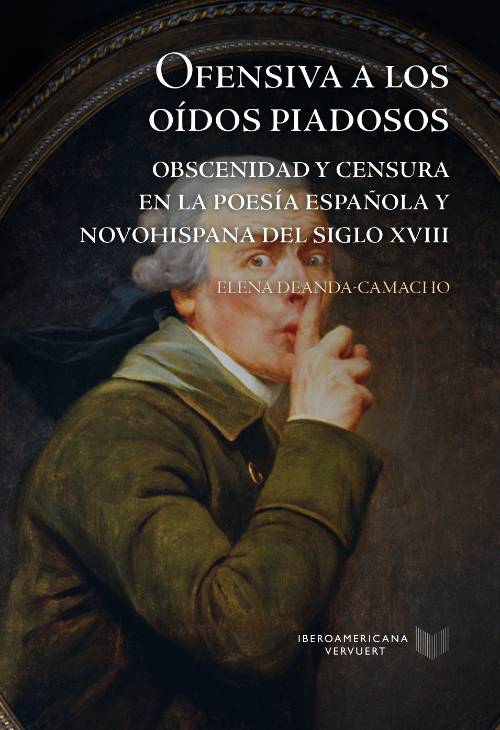Elena Deanda-Camacho
- Professor of Hispanic and Black Studies • Director of Black Studies Minor

- 410-778-6375
- edeanda2FREEwashcoll
- Goldestein 219
Office Hours
MWF 12:30 to 2:30 and F from 2:30 to 4 PM
Elena Deanda Camacho (B.A. University of Veracruz, Ph.D. Vanderbilt University) is Professor of Spanish and Black Studies at Washington College, Maryland, in the United States, where she specializes in early modern transatlantic literature, forbidden literature, the Inquisition, the 18th century, Mexico, and sexuality studies. She has published Offensive to Pious Ears, Obscenity and Censorship in 18th Century Poetry in Spain and New Spain (Iberoamericana/Vervuert, 2022) and Trovar: Metapoetics in Occitania and Sotavento (University of Veracruz, 2024). Her next monograph focuses on 18th century pornographic literature in imperial Europe. Deanda is the co-chair of the Mexico Section of the Latin American Studies Association (LASA), a MLA DAOC delegate, and the vice president of the American Society of Eighteenth-Century Studies (ASECS). She is currently a Fulbright Global Scholar in the universities of Bonn (Germany), Oviedo (Spain), and UNAM (Mexico).
Education
- Ph.D., Vanderbilt University, 2010
- B.A. University of Veracruz, Mexico, 2001
Academic Expertise
- Censorship
- Freedom of Speech
- Sex Ed
I teach classes such as Forbidden Literature; Witches, Healers, and Shamans; Women Theologians, How to Love in Early Modern Europe; Technologies of Gender and Sex; Vice and Virtue in the Renaissance; Travelogues: Crusaders, Conquerors, Immigrants; Pre-Hispanic Literature; and Afro-Latin-America. I specialize in early modern transatlantic literature, forbidden literature, the Inquisitions, Mexico, Spain, the 18th century, and gender and sexuality studies.
Additional Information
Fulbright Global Scholar 2023-2025
“El onanismo de Tissot en España: Economías espermáticas del cuerpo-nación en la censura monárquica española del siglo XVIII.” Bulletin of Spanish Studies 100. 1 (2024). 1-24.
“Celestina y el capital: La Celestina como matrix de la pornografía, la pornología
y la prostitución.” Entre ingenios y agudezas: Nuevos rumbos de la crítica celestinesca
y picaresca. Amaranta Saguar y Devid Paolini, eds. Salamanca: U of Salamanca, 2023.
163-184.
“Bailadoras: Las mujeres y el fandango en España y la Nueva España del siglo 18.”
Revista de Estudios de Género y Sexualidades / Journal of Sexuality and Gender Studies
48.1 (2022): 75-94.
"Las mujeres y sus capitales. Siglos XVIII-XXI.” Revista de Estudios de Género y Sexualidades
/ Journal of Sexuality and Gender Studies 48.2 (2022): 1-21.
“The Reproduction of Non-Productive Sex: The Brothel as a Site of Learning in English,
French, and Spanish Pornologies.” Das achtzehnte Jahrhundert 44.2 (2020): 190-209.
“Dys/Eu-phemisms: The Pornographic and the Erotic in Eighteenth Century Spanish Poetry.”
Pornographic Sensibilities. Chad Leahy and Nick Jones, eds. New York: Routledge, 2020.
110-140.
“Hell is Over: Poetry and Protest in the Folksong Jarabe Gatuno in Eighteenth Century
Mexico.” Protest in the Long Eighteenth Century. Yvonne Fuentes and Mark Malin, eds.
New York: Routledge, 2021. 213-230.
“Essay About the Indigenous Use of Pipiltzintzintzin (Cannabis Sativa)” by Antonio
de Alzate.” The Catholic Enlightenment: A Global Anthology. Ulrich Lehner and Shaun
Blanchard, eds. New York: Catholic U of America P, 2020. 117-128.
“120 Days of Sodom by Marquis of Sade.” Nineteenth Century Literature Criticism. Vol.
401. New York: Gale and Cengage, 2021. 189-194.
“La pornología como un instrumento epistemológico en Fanny Hill, Thérèse Philosophe,
el Arte de putear y las Décimas a las prostitutas de México.” Cuadernos de Estudios
del Siglo XVIII 30 (2020): 137-64.
“Fanny Hill, la pornografía y la novela sentimental: El eslabón faltante en la gesta
de la novela inglesa dieciochesca.” Nuevas Poligrafías. Revista de Teoría Literaria
y Literatura Comparada UNAM 3 (2021): 38-56.
“‘Chingaquedito:' Son y Subversión en el México del 18.” Música Oral del Sur 17 (2020):
303-21.
Best Book Award, Spanish Society of Eighteenth-Century Studies SESXVIII, 2023.
Best Book Award, Association for the Study of Gender and Sexualities, AEGS, 2023.
Best Article Award, Association for the Study of Gender and Sexualities, AEGS, 2022.
Mellon Foundation-National Museum of African American History and Culture-Chesapeake
Heartland Faculty Fellowship, 2021.
Spanish Ministry of Science and Innovation Research Award, Project: “Monarchic Censorship
in the 18th Century,” 2020-2028.
Trovar: Metapoéticas en Occitania y Sotavento [Versifying: Metapoetics in Southern
France and Southern Mexico]. México: Universidad Veracruzana, 2024.
Ofensiva a los oídos piadosos: Obscenidad y censura en la poesía española y novohispana
del siglo dieciocho [Offensive to Pious Ears: Obscenity and Censorship in 18th-Century
Spanish and Mexican Poetry]. Madrid/Frankfurt: Iberoamericana/Vervuert, 2022.
- How to Make Love in Early Modern Spain
- Love and War in the Spanish Golden Age
- Vice and Virtue in Early Modern Europe
- Prehispanic Literature
- Crusaders, Conquerors, and Immigrants
- Afro Latin America
- Tequila Gang: Mexico Across the Centuries
- Forbidden Literature
